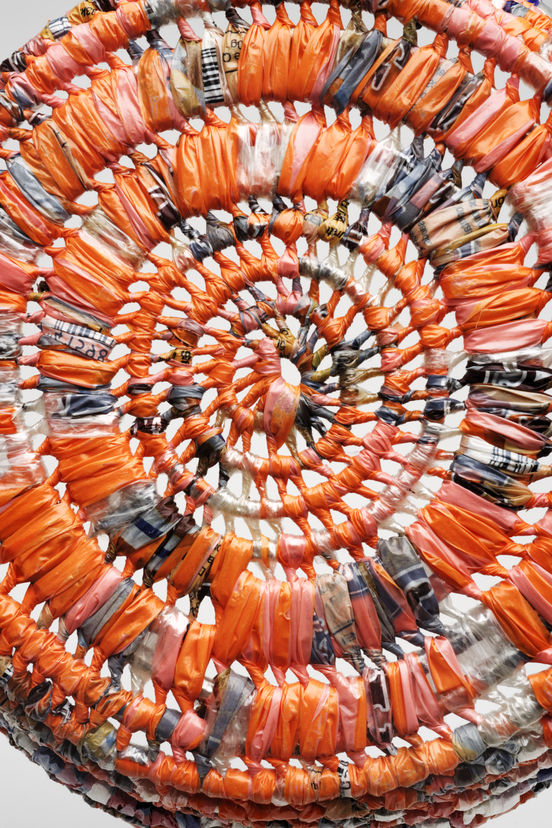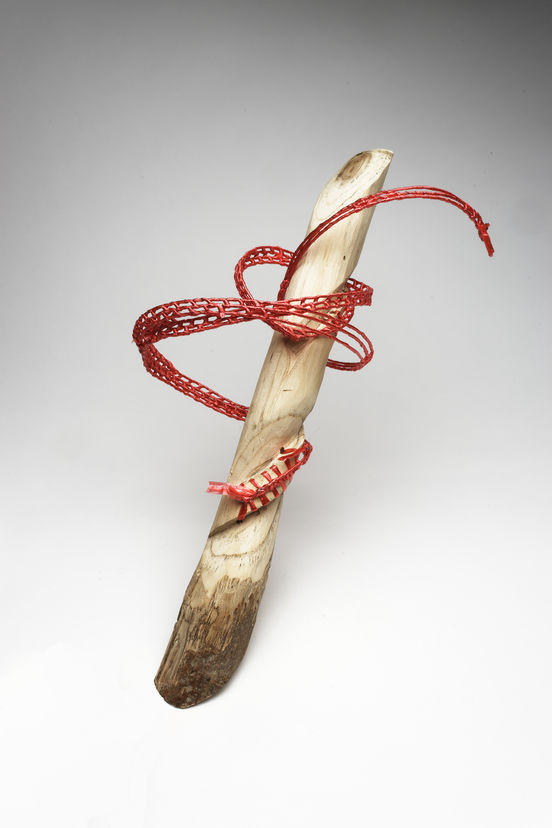Matua moe Tama is an intergenerational conversation between Salle Tamatoa and his grandmother Tunaga Funaki that illustrates the importance of magafaoa (family). The pair finds strength through the time spent making together and joy in the precious things they are surrounded by.
Growing up in Tuapa, Niue, weaving was a part of daily life for Funaki. She mastered basic weaving techniques by the time she was at school, starting first with lapa lili (table mats) before moving onto kato (baskets). When she left for Aotearoa New Zealand, weaving was a way to connect to life back home, for kinship and to create items to give as gifts of respect and gratitude to others.
As with other Niuean weavers, the materials she incorporates into her weaving have changed since leaving Niue. The works in this exhibition use fā leaves (pandanus), raffia and recycled materials. The use of recycled materials comes from necessity (as pandanus is harvested offshore and imported to Aotearoa New Zealand) but are meticulously processed with the same attention she would give fā leaves back home.
Tamatoa began weaving nine years ago, under the guidance of his grandmother. There’s a reciprocity between Tamatoa and Funaki, each creating to give the other energy and life.
Learning through making is a natural way for Tamatoa to connect with his Niuean culture across generations. Experimenting with fibres and timber, he found his hands had both the sensitivity for weaving and the strength for carving. In 2019 he started creating new works – a combination of both, moving the forms taught to him by Funaki into completely new territory. In his works, the use of wire rather than coconut rib shapes the weaving and gives him the freedom to move away from strict and uniform structures to create more fluid shapes.
--
Tunaga Funaki first came to Aotearoa New Zealand to study when she was 13-years-old. After completing high school, she travelled between Aotearoa and Niue as part of her clerical job with the Niuean government. She settled in Aotearoa in 1982 and continued public service until her recent retirement. Funaki enjoys sharing her love of weaving, crochet, sewing and knitting with younger generations of the Nieuan community in Aotearoa.
Salle Tamatoa is currently completing his Masters of Fine Arts at Whitecliffe College of Arts and Design. His practice is continuously referencing the importance of understanding Niuean cultural knowledge systems through stories, art making and iconography.
Fakaaue lahi ma Cora-Allan Wickliffe for her guidance with this exhibition.

Tunaga Funaki, Kato Taga Falaoa, 2017 Basket made using recycled bread bags. Photographer: Haru Sameshima.

Salle Tamatoa, from the series Koe Puhala Foou he Talatalai Moe Lalanga, 2020. Photographer: Haru Sameshima.